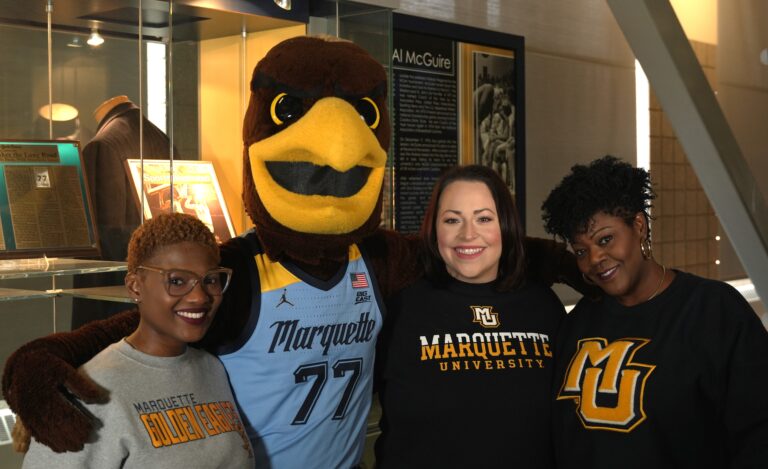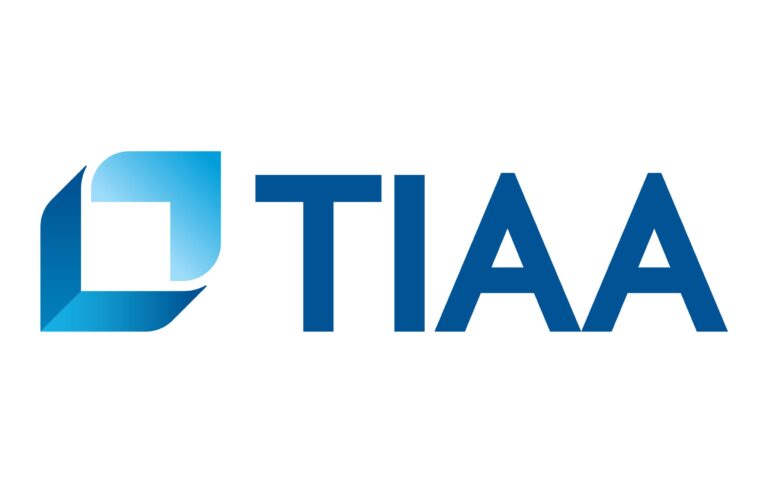
By Shelby Williamson, communication specialist in the Office of Marketing and Communication
The Office of Institutional Diversity and Inclusion (OIDI) is grounded in Marquette’s Catholic, Jesuit mission and Statement on Human Dignity and Diversity. It actively works to promote a more diverse, welcoming and inclusive campus community.
The office and its staff, all of whom notably come from different backgrounds, are collectively committed to enhancing the experience of all Marquette community members, recognizing and cherishing the dignity of each individual.
Here’s an introduction to the OIDI staff including why they are passionate about diversity and inclusion; the things being done enhance Marquette and their hopes for the future.
Dr. Joya Crear
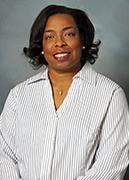
Dr. Joya Crear is the acting vice president for inclusive excellence. She stepped into the role earlier this fall following Dr. William Welburn’s retirement.
Crear has worked at Marquette since 2017. During her time so far, she has helped lead the Division of Student Affairs’ work in inclusion – particularly with its RISE program – community service, assessment, leadership development and mission integration.
“I am truly honored to serve in this role and build upon the great work of the Office of Institutional Diversity and Inclusion,” Crear says. “Marquette has an energized and vibrant population, and I am excited to build rapport and trust with Marquette students, faculty and staff and strengthen representation of those from diverse backgrounds on campus.”
Inclusive efforts such as the “Our Roots Say That We’re Sisters” mural and the Black Student Cultural Center, Crear says, serve as great motivation to create even more spaces that affirm the identities of all students, faculty and staff.
Crear is the recipient of the 2019 JASPA Outstanding Commitment to Diversity and Social Justice Award and Marquette’s Difference Maker Award for her work developing the RISE program, an orientation for multicultural and underrepresented students.
Crear has nearly 20 years of experience in student affairs leadership, particularly in the areas of diversity and inclusion, counseling and crisis intervention, strategic planning, and student retention strategies.
Prior to joining Marquette, she was the associate dean for student affairs at George Mason University. Crear holds a doctorate in counseling psychology from The Pennsylvania State University, as well as bachelor’s and master’s degrees from Howard University and the University of Wisconsin-Madison, respectively.
Jacki Black

Jacqueline “Jacki” Black is the director for Hispanic Initiatives and diversity and inclusion educational programming.
She began working at Marquette in 2016. Then, her sole focus was organizing the university’s Hispanic-Serving Institution initiatives.
“What I found was that, in addition to support for our Latinx students, there were a lot of diversity and inclusion needs across the campus community. So, we started fulfilling those needs through, for example, a small grant program for faculty to create diverse courses,” Black says. “But then we also created new educational opportunities for faculty and staff to learn about issues of diversity and inclusion, and employee resource groups for faculty and staff who come from marginalized social identities to better create community and connection on campus. So, there were different projects that we engaged in that weren’t specifically related to Hispanic initiatives and over time my work kind of grew.”
Black says she and her colleagues share a vision of Marquette being a place where everyone enjoys mutual respect. That means creating not just a pathway to get Latinx and other underrepresented students to campus but empowering students with the support and resources, such as scholarships, that they need to be successful and fostering a more inclusive campus climate. Black, who was previously a teacher for 15 years, 10 of which were at Marquette University High School where she taught Spanish classes and led the Orgullo Latino student organization, says her favorite part of her current role is having an outward facing role with the university while simultaneously getting to work with Marquette students.
“I enjoy working with young folks who come to Marquette’s campus and are finding their way,” Black says. “I love being able to use my experience to help them navigate their educational journeys and truly thrive.”
Black has been a driving force behind the university’s efforts to become a Hispanic-Serving Institution. It was announced earlier this year that it has officially earned “Emerging HSI” status with 15.4% of the undergraduate student population now Hispanic.
Samira Payne
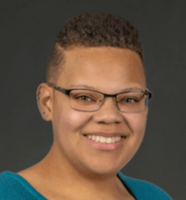
Samira Payne is the newest OIDI member. She is the first-ever director for Black student initiatives.
Payne’s role was the product of negotiations between university leadership and the Black Student Council last summer. She is responsible for tracking progress of initiatives and programs aimed at increasing recruitment and retention of Black students and improving the campus climate.
Payne, a 2010 Marquette alumna, says she is “excited to be an advocate for the Black student experience at Marquette.”
“Having a conversation about race, equity and inclusion in higher education, is something I have always wanted to be a part of,” Payne adds. “And it just made sense for me to come to this place that was formative for me to help impact more students.”
Payne says her time at Marquette expanded her world view as a first-generation, low-income student from the south side of Chicago.
In many ways she wants to preserve the kind of positive experience she had during her time as a student at Marquette – but at the same time create even more opportunities for Black students to engage in the campus community, eliminate any barriers that may prevent students from marginalized identities from pursuing their dreams and raise awareness of the kinds of resources available to empower diverse students such as scholarships, internships, living learning communities, unique serving learning options and more.
Payne says she feels a great motivation to support the students who helped advocate for her role on campus.
“I think about those who had to really fight and work hard for my role to be what it is here,” Payne says. “And then I think about the things those individuals may have missed out on because they were pushing forward on that effort. I really want to make them proud and do what I can to ensure they do not miss out on anything else.”
Across all the things she hopes to accomplish in her role, the underlying theme is “authenticity.”
When people on a college campus can be their authentic selves, Payne says, that is when progress happens.
“I know I am a better person when I able to be myself and therefore I can be a better ally to others, and they can go on to do their best work,” she adds. “Which is what students are here to do.”
Jacqueline Fontaine Schram
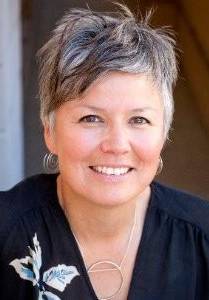
Jacqueline Fontaine Schram is the director of public affairs and special assistant for Native American affairs. She is also a doctoral student in the College of Education.
Her mission is to open the door of higher education to Native communities, as well as enhance the university’s understanding of tribes and sovereign nations and elevate the voices of Indigenous identities on campus.
“In my role, I have my feet in both worlds with the enormity of public affairs and the very focused engagement in the Office of Institutional Diversity and Inclusion in conjunction with my life as an Indigenous woman at a predominantly white institution,” Fontaine Schram says. “That said, in many senses, my works melds quite well.”
Fontaine Schram is candid about the struggles she experienced in K-12 education as one of few students with her identity. It was not until her college years at the University of Wisconsin-Milwaukee that she discovered hubs for Indigenous students to connect and thrive – thus, she understands the importance of such spaces at Marquette.
Fontaine Schram assisted in the creation of the university’s Land and Water Acknowledgement – which recognizes the long history of Native peoples and nations that lived on and stewarded the land and water where the university now resides, and celebrates the unbroken connection Native people and nations still have to this land and waterways, their traditional territories. She is also actively involved in the university’s seal re-design plans.
Fontaine Schram sees OIDI having an “Indigenous arm” in its diversity work as a way of honoring the university’s historical relationships with tribes and brings a complete, new and informed lens for inclusion in higher education to present day.
“That’s the lens on which I really draw,” Fontaine Schram says.
Fontaine Schram says she works more closely with faculty than ever before and looks forward to exploring how the OIDI’s efforts fit into the university’s growing online education and how the university continues to weave together the stories of all students to create a strong educational foundation.
Kristen Kreple
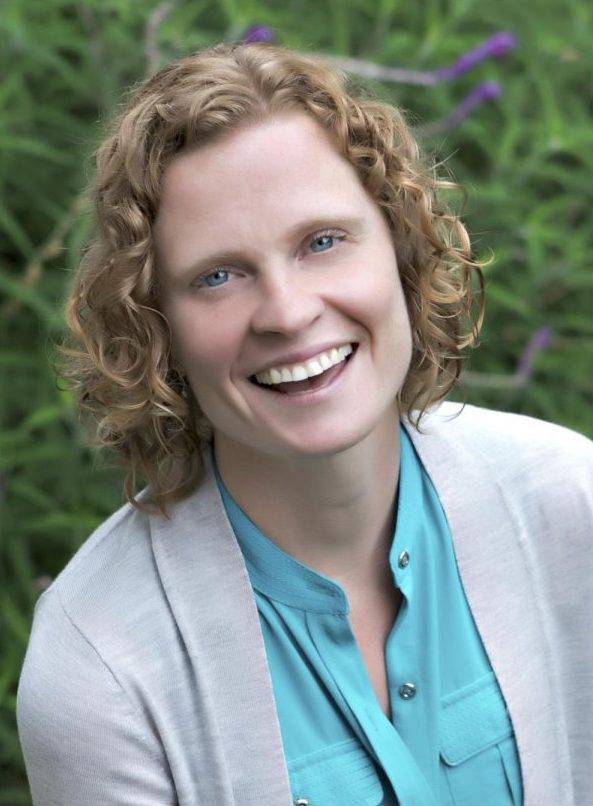
Kristen Kreple is the Title IX coordinator.
The role is one that is federally mandated and is designed to stop, prevent, and remedy discrimination and harassment based on sex, including sexual assault.
“I am the central person folks come to when they experience sex-based harassment or discrimination,” Kreple says. “I keep these conversations as private as I can. I work closely with our victim advocates in Advocacy Services, and I also do a lot of proactive training with different parts of campus to prevent problems from arising in the first place.”
Kreple says her job involves a lot of heavy work and serious responsibility that comes with a lot of discretion, but ishe is very passionate about guaranteeing students, faculty and staff have a place to bring their concerns and get the assistance they need to thrive on campus.
“We know that those who face this kind of discrimination or harassment often times face great difficulties when it comes to learning and participating in the campus community,” Kreple says. “We want to position people at Marquette to achieve their goals and continue moving forward. Knowing that I can be a part of that success really gives me the reason to continue doing this work and gives me hope for the future.”
Kreple says the OIDI is constantly working toward equity, which is a difficult thing to accomplish. However, she says she is heartened by the office’s commitment to put equity efforts into practice instead of just calling them a priority. These efforts come in many forms, from having a university-wide policy for thoroughly investigating and adjudicating allegations of sex-based discrimination or harassment, to ensuring that all student-athletes at Marquette have the same opportunities, regardless of sex.
“The Title IX Office is key to helping create a campus that is free from sex-based discrimination and harassment and welcomes and supports all members of our campus community,” Kreple says. “We are creating new opportunities and we are seeing progress – rather than just making promises, we are seeing a real shift.”


